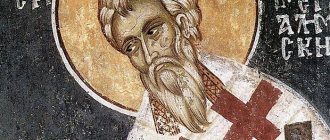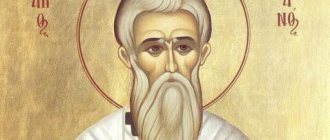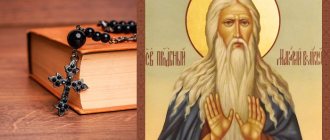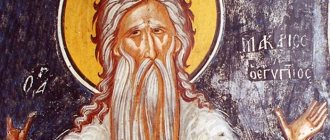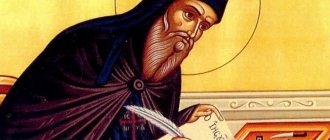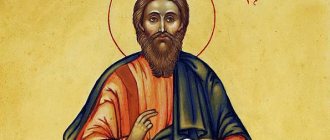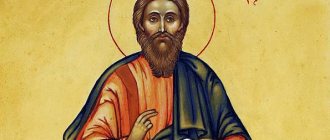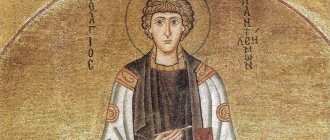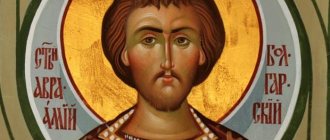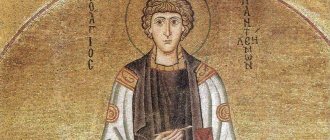What is known about the life of the saint
The secretary and assistant of St. Paulinus compiled a detailed description of the activities and life of Ambrose, much of the information was gleaned from the letters of the saint. The Bishop of Milan enjoyed great respect during his lifetime, so soon after the death of the saint, at the request of Blessed Augustine, the life of Ambrose appeared.
Origin and childhood
Ambrose's parents came from noble aristocratic families; there were many statesmen in the family who had merits for the empire. Christianity was professed in the family from the beginning of the 3rd century; according to the then existing tradition, they were baptized in adulthood. Saint Soteria, who suffered during the years of persecution of Christians during the reign of Diocletian, was a relative of the saint.
The saint's father, according to most sources, was the prefect of the Roman province of Gaul. Ambrose was born around 340 in the city of Trevir, the capital of Gaul. After the death of his father, the family moved to Rome.
Ambrose received a traditional upbringing focused on public service. He studied jurisprudence, rhetoric, history, philosophy. He proved himself to be a brilliant speaker, equally fluent in Roman and Greek.
Ambrose worked as a lawyer, his brilliant knowledge and professionalism were noticed, the young man was appointed prefect of the province with its capital in Mediolana (modern Milan).
Serving the Lord God
After the death of the Bishop of Milan, the Christian community in the city quarreled, it was not possible to choose a primate, and it came to open clashes. The saint tried to reconcile the warring parties and appeared at the cathedral, where Christians were holding elections for a new bishop. In the midst of a noisy debate, a child’s voice suddenly sounded: “Ambrose to be a bishop!” The children's words were considered the voice of God and they asked for the emperor's consent to the appointment.
The saint was not ready for a high rank, he made excuses in every possible way, but the emperor’s answer contained confirmation of the decision of the townspeople. The saint was baptized in 374, was ordained a priest, and then received the rank of bishop.
Having become a bishop, Ambrose transferred all his considerable property to the church and began to study Scripture in order to become a worthy shepherd. The saint considered his main tasks to be:
- strengthening the unity of Christians, fighting heresies, especially Arianism;
- conversion of pagans, spread of the Christian faith;
- removal of altars and statues of pagan gods from government buildings;
- participation in government affairs that strengthen the unity of the country and support Christians.
The heads of the empire (Gracian, Theodosius I) highly revered the work of the saint, and at his calls they tried to exterminate the remnants of pagan cults. Ambrose's influence was so great that the saint, outraged by the emperor's bloody massacre in Thessalonica, managed to force Theodosius to publicly repent.
Death and canonization
At the end of his life, the saint’s main concern was theological works and interpretation of sacred texts. The fame of the learned man was great; people came to him from distant lands, from other countries, to find the truth. Setting out Christian dogmas in a letter, he managed to persuade the queen of one of the German tribes to baptize and achieved peace with his warlike neighbors.
Ambrose did not forget his flock, he supported Christians, and during a visit to one of the houses he resurrected a dead child. On the instructions of the saint, 2 basilicas were built in Mediolan, and a monastery was founded. On April 4, on the day of Great Saturday in the year 397, Saint Ambrose died quietly. The bishop was buried in Milan in the basilica, under the altar, between the graves of two holy martyrs.
Prayer
We praise God to You, we confess to You the Lord, The whole earth magnifies Your Eternal Father;
To you all the Angels, to you the Heavens and all the Powers, to you the unceasing voices of the Cherubim and Seraphim cry: Holy, Holy, Holy, Lord God of Hosts, the essence of Heaven and earth are full of the majesty of Your glory. The glorious apostolic face is to you, the prophetic number of praise is to you, the bright martyr’s army praises you; Throughout the entire universe the Holy Church confesses to You: the Father of incomprehensible majesty, worshiping Your true and Only Begotten Son, and the Holy Comforter of the Spirit. You are the King of glory, Christ, You are the ever-present Son of the Father; For the sake of deliverance, when you received a man, you did not disdain the Virgin’s womb; Having overcome the sting of death, you have opened the Kingdom of Heaven to believers; You sit at the right hand of God in the glory of the Fathers, the Judge comes to believe. We therefore ask You: help Thy servant, whom Thou hast redeemed with His honest Blood, to reign with Thy saints in Thy eternal glory. Save Your people, Lord, and bless Your heritage, correct them, and exalt them forever. We will bless You all the days, and we will praise Your name forever and ever. Grant, Lord, that on this day we may be preserved without sin. Have mercy on us, Lord, have mercy on us; May Thy mercy, O Lord, be upon us, as we trust in Thee; in Thee, Lord, let us trust, let us not be ashamed forever. Amen.
Translation: We praise You, God, We confess You, Lord, The whole earth magnifies You, the eternal Father. To you all the Angels, to you the heavens and all the powers, to you the Cherubim and Seraphim cry with unceasing voices: “Holy, holy, holy is the Lord God of hosts, heaven and earth are full of the majesty of your glory.” You are the glorious apostolic council, You are the praising multitude of prophets, The bright army of martyrs praises You. The Holy Church confesses You throughout the entire universe, the Father of incomprehensible majesty, worthy of worship, Your True and Only Begotten Son and the Holy Comforter of the Spirit. You are the King of glory, Christ, You are the Ever-Existing Son of the Father. To deliver people, you did not disdain the Virgin’s womb.
You, having won victory over death, created the kingdom of heaven for believers. You sit on the right side of God in the glory of the Father and we believe that You will come to judge us. Therefore we ask You: “Help Your servants, whom You have redeemed with Your precious blood. Make us worthy to reign with Your saints in Your eternal glory. Save, O Lord, Your people and bless Your inheritance, rule them and magnify them forever.” We will bless You all the days and praise Your name forever and ever. Grant, Lord, that on this day we may be preserved without sin. Have pity on us, Lord, and have mercy on us. May Your mercy, O Lord, be upon us, for we trust in You. We trust in You, Lord, so that we may not be ashamed forever. Amen
Why should an Orthodox regularly read the hymn of thanksgiving to Ambrose and what is its benefit?
The song is a joyful hymn of thanksgiving to God, pouring out from the soul. It is not without reason that it is often performed at thanksgiving services or before Communion. The words of the saint are also read at home, especially when one wants to express deep gratitude to Christ for His benefits. In addition, reading a hymn is a kind of entering into spiritual communication with its holy author, becoming familiar with his experience.
Song of praise to St. Ambrose of Milan video
“We praise God to you” D. Bortnyansky. Performed by the choir of the church in honor of the Most Merciful Savior in Nizhny Novgorod, regent Olga Bogodukhova, conductor Anatoly Gorelovsky.
On the prayer of a priest preparing to celebrate the liturgy
This text is part of a special Sequence performed by a priest preparing for the liturgy. Through prayer he turns to Christ as the true Bishop, asking for blessings, help, correction of his infirmities, and cleansing from passions.
St. Ambrose of Milan. Miniature Greco-cargo. manuscripts. XV century (RNB)
The creative heritage of the saint
Ambrose became especially famous as a Christian writer; the saint transferred and developed many Eastern traditions of theology and church practice, making them understandable to Western people. The saint's works include:
- interpretation of the Holy Scriptures - the doctrine of the Holy Trinity, the “Creed”, repentance;
- explanations of the tasks of priests;
- issues of interaction between the church and government;
- explanation of the essence of the sacraments;
- interpretation of biblical texts about heaven;
- private letters with reflections on theological topics;
- hymns.
The saint interpreted the “Six Days”, taking as a basis the Eastern interpretation of the transformation of bread and wine into the body and blood of Christ, and affirmed the importance of communion. Subsequently, the Catholic Church accepted this as a dogma. Ambrose made a significant contribution to the transformation of the traditions of church singing and hymn singing. The saint himself wrote 12 hymns and introduced antiphonal singing, characteristic of the Byzantine church, into practice. The divine services of the Orthodox Church include the hymn “We Praise You, O God,” written by the saint in 386.
Editions and translations[ | ]
Divi Ambrosii Episcopi Mediolanensis Omnia Opera, 1527
- S. Ambrosii Epistolae et alia opuscula. Mediolani, 1491.
- Sancti Ambrosi opera // CSEL 32, 62, 64 73, 78, 79, 82 (multi-volume critical edition)
- Ambrose of Milan
. Complete creations. - Kyiv, 1875. - About the positions of clergy of the Church of Christ. - Kyiv, 1875. LXXIX, 222 p.
- Two books about repentance. / Per. I. Kharlamova. - M., 1884. - 219 p. reprint: Ambrose of Milan
. Two books about repentance. Two books about the death of his brother Satyr. A word of consolation on the death of Emperor Valentinian the Younger. Word on the death of Theodosius the Great. Church, mystical Eve. Hymns. / Per. prot. Ioanna Kharlamov, entry. Art. V. A. Nikitina. (Series “Teachers of the Undivided Church”). - M., Educational and Information Ecumenical Center of the Ap. Pavel. [1997?]. — 208 p.
- (reprint: M., 1997; M., ISIS. 2000.)
- (reprint: M.; Riga: Blagovest, 1995. - 379 p.)
The essay “On Responsibilities” was published in the “Collection Budé” series:
- Saint Ambroise
. Les Devoirs. T. I: Livre I. Texte établi, traduit et annoté par M. Testard. 2e circulation 2002. — 412 p. - T. II: Livres II et III. Texte établi, traduit et annoté par M. Testard. 2e circulation 2002. - 411 p.
The meaning of a saint in Orthodoxy
The saint showed an instructive example of the ability to interact with authorities. The bishop of Milan imposed penance on the emperor and managed to convince the all-powerful head of the empire of the need for repentance.
The Orthodox are close to the saint’s ideas about non-covetousness and the equality of all in Christ. St. Ambrose did not consider it a great merit to help the poor, because the Lord bestowed blessings on all people, the rich simply managed to collect more from the common bins, and must repay their debts.
The saint delivered fiery sermons, attracted the hearts of people to God's word, managed to convert many pagans, establish the Christian faith, and become a spiritual ruler, simply glorifying Christ.
Reference: Ambrose undoubtedly parted with enormous personal wealth, led a righteous life, and achieved such respect that the Milanese began to be called Ambrosians.
Notes[ | ]
- Aurelius Ambrose // Ancient writers. - St. Petersburg: Lan, 1999.
- Dreves GM
Aurelius Ambrosius, der Vater des Kirchengesanges: eine hymnologische Studie. - Freiburg, 1893. - Skurat K. E., Gratsiansky M. V., Fokin A. R., E. P. S., Lebedev S. N., Nikiforova A. Yu., Zaigraykina S. P.
St. Ambrose of Milan // Orthodox Encyclopedia. - M., 2001. - T. II: “Alexy, man of God - Anfim of Ankhialsky.” - pp. 119-135. — 752 p. — 40,000 copies. — ISBN 5-89572-007-2. - Adamov, 1915, p. 8-11.
- Palanque J.
La vita Ambrosii de Paulin: étude critique // Revue des Sciences Religieuses. - 1924. - Vol. 4, no. 1. - P. 26-46. - doi:10.3406/rscir.1924.1243. - Adamov, 1915, p. 6-7.
- Translations of incipits: “Immortal creator of all things”, “God, creator of all things”, “The third hour has already come”, “Come, Savior of nations.”
- Kähler E.
Studien zum Te Deum und zur Geschichte des 24. Psalms in der alten Kirche. Gottingen, 1958. - This point of view was defended, for example, by Guido Dreves, see: Dreves GM
Aurelius Ambrosius, der Vater des Kirchengesanges: eine hymnologische Studie. Freiburg, 1893. - McKinnon J.
Ambrose // The New Grove Dictionary of Music and Musicians. L., NY, 2001.
Reverence
During his lifetime, the saint was highly revered by ordinary Christians and authorities. Already in the 5th century, lives were written in two languages - Latin and Greek. Veneration of the saint developed in the Western and Eastern churches.
The liturgical rite adopted by Ambrose is still performed in the diocese of Milan. Catholic spiritual unions that developed the ideas of the saint were called Ambrosian. The saint is considered the heavenly patron of Milan. The basilicas built on his initiative are greatly loved by the townspeople and all Christians.
The Ambrosian readings (international forum) bring together many Christians who venerate the saint. Many pilgrims go to Milan to venerate the relics of Ambrose. The saint's memorial day is December 20.
Iconography
Icon painters depict the saint as an old man with a beard, wearing the robes of a bishop and with the attributes of the episcopal rank. Often on icons, Ambrose holds a whip in his hands - a symbol of the fight against Arianism. A mosaic icon of the saint, dating from the 5th century, has been preserved in the Milan Church of St. Ambrose. Great painters (van Dyck, Rubens) depicted the saint on their canvases.
Literature[ | ]
- Adamov I. I.
Saint Ambrose of Milan. - Sergiev Posad, 1915. - 584 p. - Albrecht M. von
. History of Roman Literature. T. 3. - M., 2005. - P. 1771-1786. - Ambrose of Milan / O. V. Golova // New philosophical encyclopedia: in 4 volumes / prev. scientific-ed. Council V. S. Stepin. — 2nd ed., rev. and additional - M.: Mysl, 2010. - 2816 p.
- Ambrose of Milan / Ovsienko F. G., Lebedev S. N. (hymnographic works) // A - Questioning. - M.: Great Russian Encyclopedia, 2005. - P. 597. - (Big Russian Encyclopedia: [in 35 volumes] / chief editor Yu. S. Osipov; 2004-2017, vol. 1). — ISBN 5-85270-329-X.
- Ambrose of Milan // Encyclopedic Dictionary of Brockhaus and Efron: in 86 volumes (82 volumes and 4 additional). - St. Petersburg, 1890-1907.
- Gratsiansky M.V., Zaigraykina S.P., Lebedev S.N., Nikiforova A.Yu. and others.
Ambrose // Orthodox Encyclopedia. - M., 2001. - T. II: “Alexy, man of God - Anfim of Ankhialsky.” - pp. 119-135. — 752 p. — 40,000 copies. — ISBN 5-89572-007-2. - Life of our holy father Ambrose, Bishop of Milan // Lives of the saints in Russian, set out according to the guidance of the Chetyih-Menya of St. Demetrius of Rostov: 12 books, 2 books. add. - M.: Moscow. Synod. typ., 1903-1916. — Vol. IV: December, Day 7.
- Zakharov G. E.
The Roman Council of 382 in the context of church-political activities and ecclesiological views of St. Damasus of Rome and St. Ambrose of Milan // Bulletin of PSTGU. Series II: History. History of the Russian Orthodox Church. — 2022. — Issue. 80. - pp. 9-28. - Kazakov M. M.
Bishop and empire: Ambrose of Milan and the Roman Empire in the 4th century. - Smolensk, 1995. - 336 p. - Catholic Encyclopedia. - M.: Publishing house. Franciscans, 2002.
- Losev S.
St. Ambrose of Milan as an interpreter of St. writings of the Old Testament. - Kyiv, 1897. - Paredi A.
Saint Ambrose of Milan and his time. - Milan: Christian Russia, 1991. - Ponomarev A.I.
Ambrose of Milan // Orthodox Theological Encyclopedia. T. 1. Petrograd edition. Supplement to the spiritual magazine “The Wanderer” for 1900. - Shchegoleva L.I.
Stories about Ambrose of Milan in the time book of St. George the Monk // Ancient Russia. Questions of medieval studies. - 2003. - No. 1(11). — P. 30-38.
Lyrics
In front of the icon of the saint, you can read canonical texts or make requests to Ambrose in your own words.
Kontakion
By illuminating divine dogmas, / you have darkened the charm of Arius, the priest and shepherd Ambrose, / working miracles with the power of the Spirit, / you have healed various passions in reality, reverend father, // pray to Christ God for the salvation of our souls.
Troparion
The rule of faith and the image of meekness, / teacher self-control / show you to your flock / Even the things of Truth. / For this reason, you have gained high humility, / rich in poverty, / Father Ambrose, / pray to Christ God, // to save our souls.
In kontakion
Having acquired a fair amount of the word of life, the wise father, / not doubting the heights of the king, convicting and making the king wiser than God punished him. / All the more honestly, honor your people and guide your flock to God. / For this reason we call you: // Rejoice, wonderful Ambrose.
Ambrose made a significant contribution to the recognition of the Christian faith by the authorities of Rome, converted pagans, and carried the word of God. The saint believed that the principles of Christian morality would make the state and government more humane and fair. Ambrose fought against heresies, defended the foundations of the faith, and helped ordinary people in word and deed.
